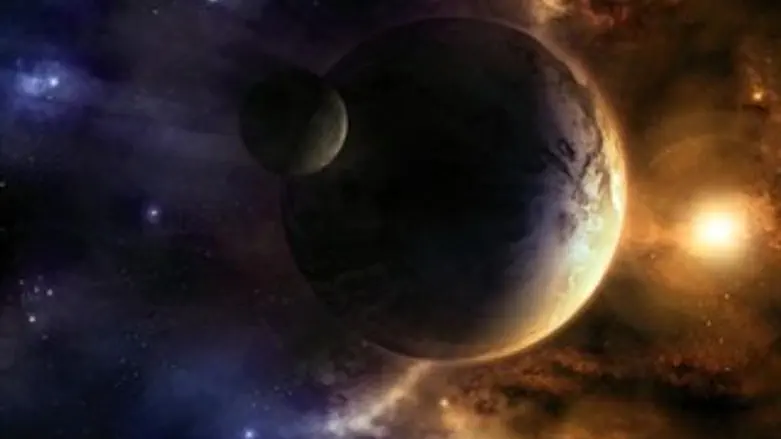
Jacob receives the amazing news –" וַיַּגִּדוּ לוֹ לֵאמֹר, עוֹד יוֹסֵף חַי" - Joseph is still alive, and his spirit was revived –" וַתְּחִי, רוּחַ יַעֲקֹב אֲבִיהֶם". Jacob decides to go down to Egypt and live alongside his son. On his way to Egypt he gives sacrifices to G-d and G-d reveals himself to him during the night –
"וַיִּזְבַּח זְבָחִים, לֵאלֹהֵי אָבִיו יִצְחָק. וַיֹּאמֶר אֱלֹהִים לְיִשְׂרָאֵל בְּמַרְאֹת הַלַּיְלָה, וַיֹּאמֶר יַעֲקֹב יַעֲקֹב; וַיֹּאמֶר, הִנֵּנִי. וַיֹּאמֶר, אָנֹכִי הָאֵל אֱלֹהֵי אָבִיךָ; אַל תִּירָא מֵרְדָה מִצְרַיְמָה כִּי-לְגוֹי גָּדוֹל אֲשִׂימְךָ שָׁם. אָנֹכִי אֵרֵד עִמְּךָ מִצְרַיְמָה, וְאָנֹכִי, אַעַלְךָ גַם-עָלֹה "(בראשית מ"ו, א'-ב')
It appears that Jacob was afraid to go to Egypt, and therefore prayed to G-d. The commentators point out that Jacob brought sacrifice to the G-d of his father, Isaac, but not of the father of Abraham. They offer different explanations; Some (Radak and Rashi, for instance) remind us that Isaac never left the land of Israel, and that even during the time of famine that occurred during his days he was commanded by G-d not to leave the country. Remembering the example of his father, Jacob was not sure he should be leaving Israel, even during such a severe famine.
What is the danger in leaving Israel? The Medrash Pirkei De'Rabi Eliezer brings the following:
"שמע יעקב על יוסף שהוא חי והיה מהרהר בלבו ואומר: איך אעזוב ארץ אבותי וארץ מולדתי ואת ארץ ששכינתו של הקדוש ברוך הוא בקרבה ואלך אל ארץ טמאה לתוך העבדים, בני חם, בארץ שאין יראת שמים ביניהם?
אמר לו הקדוש ב"ה יעקב אל תירא מרדה מצרימה אנכי ארד עמך..."
(פרקי דרבי אליעזר פרק ל"ח)
Jacob heard the Josef was alive and he thought to himself: How can I leave the land of my fathers, my homeland, the land where Hashem's divine presence resides, and go to an unclean land, full of slaves, the descendants of Ham, to a land without the fear of G-d?
Jacob understands that leaving the land of Israel also means leaving sanctity, leaving the presence of G-d. Rabbi Hirsh points out that the fact that G-d revealed himself at night (במראות הלילה) indicates that this revelation is on a lower level than previous ones.
This week we ended the festival of lights, and in the coming week we will be noting the 3 days of darkness – the 8th 9th and 10th of Tevet; In the Selichot for the 10th of Tevet we mention that on the 8th of Tevet the Torah was translated into Greek and darkness had come to the world for three days. What is the meaning of darkness and how do we find light?
The life we lead in this world could seem at times like a random sequence of events, or a futile struggle to survive and even have some pleasure in life. But is that the purpose of life? Is that the reason we were brought into this world?
Back in those days, and so too during ours, we are witnessing a clash of cultures, an ideological battle between those who strive to lighten life with true light, and those who yearn to darken life and the world. Light is the ability to see above and over the daily, mundane events, and to find holiness that raises and elevates life to higher existence. On the other hand, darkness is the perception that the world has no holiness, and that events in this world will never rise beyond human understanding.
The Midrash points out the following –
"ירושלים אורו של עולם. שנאמר: (ישעיה ס) "והלכו גוים לאורך" ומי הוא אורה של ירושלים? הקדוש ברוך הוא דכתיב - "והיה לך ה' לאור עולם."
(בראשית רבה פרשת חיי שרה פרשה נ"ט)
Jerusalem is the light of the world, and G-d is the light of Jeruדalem. When we are looking for ways to improve the world, to elevate reality, we must remember to connect our actions to Jerusalem, and connect our thoughts and deeds to G-d. We may not neglect or ignore this world, but rather act in and through it. We go to Egypt if famine forces us to, but we do it with fear and concern – since we are endangering our connection to spirituality and holiness.
The Meshech Chochma points out the Jacob is unique in the fact that twice we find G-d revealing himself to him at night, and both are at the times he is about to leave the land of Israel (the first is when he escapes from Esau and dreams the famous dream of the ladder). The Meshech Chochma cites this as the reason the Rabbis associated Jacob with the prayer of the evening – Ma'ariv. Jacob symbolizes living in the darkness, the life of one who is forced to flee his homeland and is exiled, first to Charan, and later to Egypt. He is afraid of the shadows, but has the promise of G-d that he will go down to Egypt with him, and ultimately will also bring him back.
May we walk in the footsteps of our forefather Jacob and make sure we are connected to the light of life, to Jerusalem and to G-d. May we make sure that we don't sink into a mundane perception that doesn't allow spirit and sanctity in it, but rather be like the Maccabees who knew to fight for their freedom on one hand, but also to keep their tradition and stay connected to G-d.
Torah MiTzion (see their dynamic website) was established in 1995 with the goal of strengthening Jewish communities around the globe and infusing them with the love for Torah, the Jewish People and for the State of Israel. Over the past eighteen years Torah MiTzion has recruited, trained and dispatched more than one thousand 'shlichim' (emissaries) to Jewish communities in countries spanning five continents and impacted Jewish communities with an inspiring model of commitment to both Judaism and Zionism.
